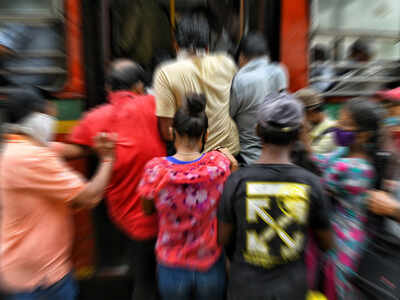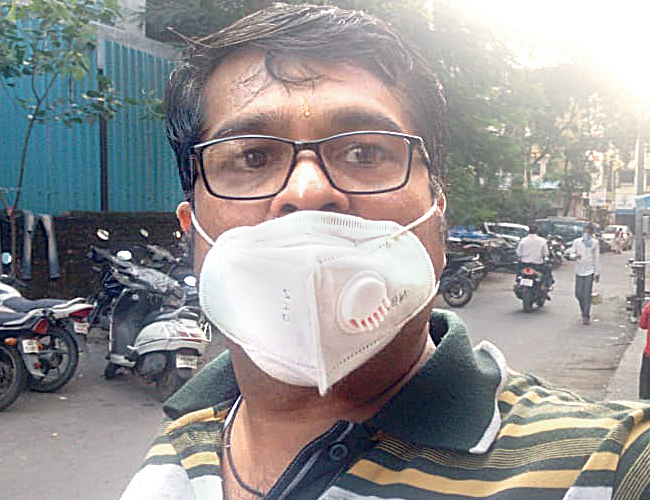Private bus commuters paying up to Rs 500 a day

REPRESENTATIONAL PICTURE
In a bid to avoid jam-packed BEST buses, commuters have to use private buses that are running at 50% capacity; govt yet to review capacity.
Although more and more categories of people are being accommodated into the suburban railway system, the problems of most of the commuters remain unsolved.
There are several people who spend up to eight hours a day on travelling to their place of work and back. The people living in the suburbs andsatellite towns , who have their offices in south Mumbai, are particularly facing the problem of daily commuting.
Untitled Carousel
Besides the time factor, there is the issue of cost of travelling. The privately-run buses are charging double the fare of what it used to be before the Covid pandemic. This is because the state government has yet to take a decision on the issue of fares.
Keyur Shah, daily commuter, has a long of list of woes. A resident of Bhayandar, Shah has been using a private bus to travel to his office in Opera House in south Mumbai for the past 2-3 months. He leaves his house around 7am and reaches office by 10-10.30 am as his 50-seater private bus struggles in heavy traffic all through the route.
Untitled Carousel
“I have been working six days a week for the past three months now. Every day, I pay Rs 300 each day for my 7-hour journey to and fro. The buses have only 50 percent occupancy, and the fares are very high. But what can be done? We have to go to work come what may,” said Shah ,who works in an automobile company.
The buses operated by BEST and MSRTC are always crowded. In fact, the state government has allowed BEST to run its buses at 100 per cent capacity. As the buses are currently carrying almost 20 lakh people every day, the chances of the coronavirus infection spreading have increased manifold.

Like Shah, there is Vishansingh Rajpurohit, who too travels all the way from Vasai to Thakurdwar in private bus. “I travel thrice a week, but it costs at least Rs 500 each day for the journey. The road traffic makes it a hellish commute. I hope that the government allows everyone to travel in local trains,” said Rajpurohit, who works in the media industry.
Both Shah and Rajpurohit, like many others, are already grappling with salary cuts. They are paying from their own pocket for their daily travel, which otherwise would have been the cost of travel for a month in a local train.
Untitled Carousel
The private bus operators are running close to 900 buses daily carrying regular office-goers or have tied up with corporates who use these buses for ferrying their employees.
“We have been running these buses at 50 per cent capacity. So, the fare per seat is high as we are forced to pass on the cost to these passengers or their companies,” said N Anthony, owner of Comfy Travels, which operates several private buses in the city and MMR.
The bus operators claim that they have written to the government several times and even met the transport department officials to amend theCovid-related rules for private buses.
Moreover, the operators claim, plying the buses of corporates helps keep their staff safer.
“We have asked the government to allow us to operate buses at 100 per cent capacity. When BEST has been allowed, why not us?” said Harsh Kotak,Mumbai Bus Malak Sanghatana .
Although more and more categories of people are being accommodated into the suburban railway system, the problems of most of the commuters remain unsolved.
There are several people who spend up to eight hours a day on travelling to their place of work and back. The people living in the suburbs and
Besides the time factor, there is the issue of cost of travelling. The privately-run buses are charging double the fare of what it used to be before the Covid pandemic. This is because the state government has yet to take a decision on the issue of fares.
Keyur Shah, daily commuter, has a long of list of woes. A resident of Bhayandar, Shah has been using a private bus to travel to his office in Opera House in south Mumbai for the past 2-3 months. He leaves his house around 7am and reaches office by 10-10.30 am as his 50-seater private bus struggles in heavy traffic all through the route.
“I have been working six days a week for the past three months now. Every day, I pay Rs 300 each day for my 7-hour journey to and fro. The buses have only 50 percent occupancy, and the fares are very high. But what can be done? We have to go to work come what may,” said Shah ,who works in an automobile company.
The buses operated by BEST and MSRTC are always crowded. In fact, the state government has allowed BEST to run its buses at 100 per cent capacity. As the buses are currently carrying almost 20 lakh people every day, the chances of the coronavirus infection spreading have increased manifold.

Keyur Shah, who commutes from Bhayandar to south Mumbai six days a week, ends up paying a month’s travel expenses daily
Like Shah, there is Vishansingh Rajpurohit, who too travels all the way from Vasai to Thakurdwar in private bus. “I travel thrice a week, but it costs at least Rs 500 each day for the journey. The road traffic makes it a hellish commute. I hope that the government allows everyone to travel in local trains,” said Rajpurohit, who works in the media industry.
Both Shah and Rajpurohit, like many others, are already grappling with salary cuts. They are paying from their own pocket for their daily travel, which otherwise would have been the cost of travel for a month in a local train.
The private bus operators are running close to 900 buses daily carrying regular office-goers or have tied up with corporates who use these buses for ferrying their employees.
“We have been running these buses at 50 per cent capacity. So, the fare per seat is high as we are forced to pass on the cost to these passengers or their companies,” said N Anthony, owner of Comfy Travels, which operates several private buses in the city and MMR.
The bus operators claim that they have written to the government several times and even met the transport department officials to amend the
Moreover, the operators claim, plying the buses of corporates helps keep their staff safer.
“We have asked the government to allow us to operate buses at 100 per cent capacity. When BEST has been allowed, why not us?” said Harsh Kotak,
GALLERIES View more photos
































